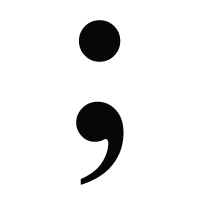And you didn’t think there was one, did you?
Well, there is. At least I’m declaring it so, here and now.
When it comes to fiction, I think of semi-colons the way I think of eggplant: avoid at all costs. As Kurt Vonnegut once said, “Here is a lesson in creative writing. First rule: Do not use semicolons … All they do is show you’ve been to college.”
The semi-colon is a burp, a hiccup. It’s a drunk staggering out of the saloon at 2 a.m., grabbing your lapels on the way and asking you to listen to one more story.
Not that I have an opinion, you understand.
Okay, I’ll modify things a bit. For non-fiction, like essays and scholarly writing, the semi-colon does serve a purpose; I’ve used them myself. In such writings you’re often stringing two thoughts together for a larger point, and the semi-colon allows you to clue the reader in on this move.
But in fiction, you want each sentence to stand on its own, boldly. The semi-colon is an invitation to pause, to think twice, to look around in different directions, to wonder where the heck you’re standing. Do you want that? Or do you want your story to move?
The semi-colon is a stone that causes the reader to stumble.
Not that they’ll notice this on a conscious level. Most won’t think, “Why’d he use a semi-colon here? I’m being taken out of the story!” No, but it will have that very effect, on a subconscious level. It will weaken the reading experience in a small way. Not fatally, but why would you want even a small speed bump in your story?
The semi-colon is especially grating in dialogue:
“We must run to the fire,” Mary said. “It is going to burn the town; that is a disaster!”
What’s that semi-colon doing there? Is it making Mary’s dialogue stronger or weaker? Is it adding to the intensity of the moment or diluting it?
Semi-colons. For academics, yes. For novelists, no.
I’ll leave you with this clip from a poem entitled “On Punctuation” by Elizabeth Austen. You may then offer your own opinion on the great semi-colon debate!
. . .as for the semi-
colon call it what it is
a period slumming
with the commas
a poser at the bar
feigning liberation with one hand
tightening the leash with the other
. . .
“On Punctuation” by Elizabeth Austen, from The Girl Who Goes Alone. © Floating Bridge Press, 2010

